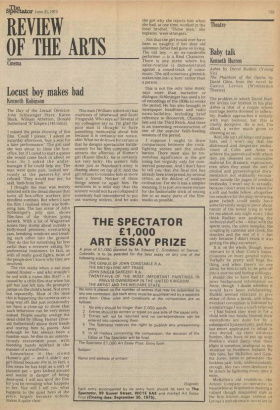REVIEW OF THE ARTS
Cinema
Locust boy makes bad
Kenneth Robinson
The Day of the Locust Director: John Schlesinger Stars: Karen Black, William Atherton, Donald Sutherland 'X' Empire (145 mins).
I missed the press showing of this film. 'Could I please,' I asked on Saturday afternoon, 'buy a seat for a later performance.' The girl said she was about to close the boxoffice, but if I cared to start a queue she would come back in about an hour. So I asked the undermanager if he could help me. The . man went quite pale, looked nervously at the passers-by and refused. 'They would tear me,' he said, 'limb from limb.'
I thought the man was merely infected with the dread disease that turns all box-office workers into mindless zombies. But when I saw the film I realised what was bothering him. The last scene of John Schlesinger's jolly epic shows film-fans of the 'thirties going berserk. With a lot of Wagnerian noises they stomp about outside a Hollywood premiere, overturning cars, breaking windows and treading each other into the ground. They do this for something far less awful than a reviewer asking for preferential treatment. In fact, as with all really good fights, most of the people don't know why they are involved.
The riot starts when a sad man named Homer — and who wouldn't be sad with a name like that? — is teased by a child film-star when his girl has just left him. He promptly jumps on the child's head. Not once but repeatedly. Most of the time this is happening the cameras are a long way off. But just occasionally we have a close-up to show that such behaviour can be very messy indeed. People nearby avenge the dead child by lifting Homer (Donald Sutherland) above their heads and tearing him to pieces. And although he has always been a humble man, he dies in an ostentatiously statuesque pose, with bleeding hands uplifted in the manner of a crucifixion.
Somewhere in the crowd Homer's girl — and I didn't say girl-friend because she is, in fact, a film extra he has kept as a sort of platonic pet — gets kicked around and seems in danger of being destroyed. I will not spoil the film for you be revealing what happens to her. Nor will I tell you what happens to the quiet hero of the piece, largely because nobody makes it quite clear. This man (William Atherton) has overtones of Isherwood and Scott Fitzgerald. Who says so? Several of my colleagues say so. I'm glad the poor man is thought to have something memorable about him because it is certainly not noticeable. What we do know for certain is that he designs spectacular battlescenery for his film company and attracts the affection of Homer's girl (Karen Black). He is certainly not very lucky. His scenery falls down just as Napoleon's army is chasing about on top of it. And the girl refuses to consider him as more than a friend. Neither of these things seems to upset him. He mentions in a mild way that the scenery would not have Collapsed if somebody had remembered to put out warning notices. And he asks the girl why she rejects him when she had, at one time, worked in the local brothel. 'Those men,' she explains, 'were strangers.'
Not that the girl would ever have been so naughty if her dear old salesman father had gone on living. The old boy — an ex-vaudeville performer — is a Real Character. There is one scene where his sales-routine is demonstrated against a sound-track of comic music. The self-conscious gimmick makes him into a 'turn' rather than a person.
This is not the only time music says more than narrative or dialogue. Schlesinger has used a lot of recordings of the 1930s to evoke the period. He has also brought in newspaper headlines and radio news-bulletins, including brief reference to Roosevelt, Chamberlain and the Third Reich. And there is an interesting reconstruction of one of the popular faith-healing sessions of the period.
I suppose I ought to draw comparisons between the cockfighting scenes and the studio battles. There must also be tre.mendous significance in the girl losing her virginity only for commercial purposes. And I don't have to tell you that the final riot has already been interpreted, by several critics, as the decline of western civilisation. For me it has a simpler meaning. It is just one more excuse for the fashionable trick of setting fire to as many parts of the filmstudio as possible.


































 Previous page
Previous page